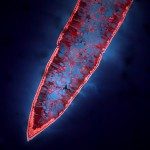In the lab, we are focusing on bacterial mechanisms of survival in hostile environments containing sub-lethal antibiotic concentrations.
The emergence of antibiotic resistance is increasingly associated with low antibiotic concentrations in the aquatic environment, such as lakes and rivers neighboring hospitals and pharmaceutical industries in certain countries, and in aquaculture farms, where antibiotics are regularly used. These environments are host to various bacteria (among which Vibrios). Low antibiotic concentrations can also be found in different compartments of the body upon antibiotic treatment: for example, in the lungs where they diffuse at different rates, or in the urine at the end of antibiotic treatment.
Research on antibiotic resistance usually focuses on resistance mechanism to high antibiotic doses which kill bacterial cells. Because we are studying the effects of low antibiotic doses, we can identify new targets involved in antibiotic resistance development.One new factor in antibiotic tolerance that we have recently identified involves bacterial RNA modifications.
RNA molecules constitute the template and machineries to produce proteins, therefore RNA modifications impact the production of bacterial proteins. Proteins are the building blocks of the cells and allow bacteria to survive.
Presence or absence of some RNA modifications confer, not resistance, but increased or decreased tolerance to antibiotics, which may lead to treatment failure, and development of antibiotic resistance. Our project addresses antimicrobial resistance, under the prism of the less well studied “observable resistance”, where populations of bacteria start tolerating antibiotics and become resistant, without the presence of known genetic resistance determinants in their chromosomes.
The diversity of RNA modifications, their specific influence on bacterial traits and behaviors, and the possibility that they are tuned by the conditions where bacteria grow, make them now a promising field of study.
Based on this, one can also envisage applying identified associations between RNA modifications and antibiotic resistance phenotypes, for the analysis of available bacterial collections with established genome sequences and resistance profiles, for which observed antibiotic resistance does not always correlate with known resistance factors.



